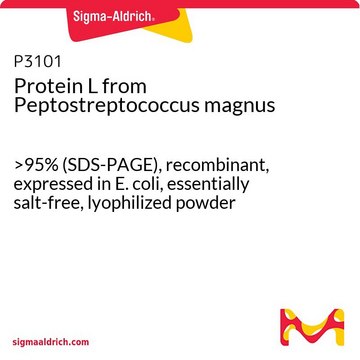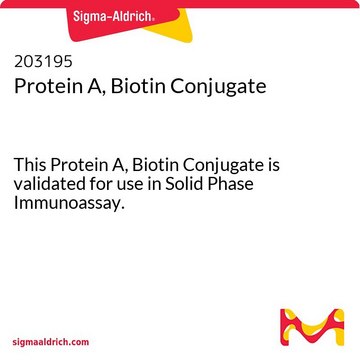P8045
Protein G-Biotin from Streptococcus sp.
recombinant, expressed in unspecified host, lyophilized powder
Sinónimos:
Biotinylated Protein G, Protein G Biotin, Protein G-Biotin
Iniciar sesiónpara Ver la Fijación de precios por contrato y de la organización
About This Item
Productos recomendados
recombinante
expressed in unspecified host
Nivel de calidad
conjugado
biotin conjugate
Formulario
lyophilized powder
composición
Protein, ~90% biuret
Extensión del etiquetado
2-4 mol d-biotin per mol protein
técnicas
direct ELISA: 1:70,000 using human IgG
temp. de almacenamiento
2-8°C
Descripción general
Protein G binds to antibodies reversibly and thus, it is considered in antibody purification. It is a 20 kDa protein.
Protein G is an immunoglobulin (IgG) specific bacterial cell wall protein isolated from Streptococci (group G). Native proteins G consist of two IgG-binding domains and albumin and cell surface binding sites. Biotin is a water soluble vitamin that acts as a coenzyme for carboxylase enzyme reactions. Biotin deficiency results in deregulation of metabolic pathways and various physiological impairments. Biotin deficiency is known to cause birth anomalies indicating its important role in development and differentiation of embryos.
Especificidad
Binds IgG only from most mammalian species except cat; binds chicken IgG.
Aplicación
Protein G-Biotin from Streptococcus sp. has been used during incubation for synergistic immunocapture of antigen which was performed using streptavidin-coated magnetic beads.
Protein G-Biotin from Streptococcus sp. has been used in electrochemical biosensing, for the attachment of antibodies with different specificities.
Envase
Package size based on protein content
Otras notas
Truncated - lacks albumin, Fab and membrane binding sites.
Nota de preparación
Prepared using biotinamidocaproate N-hydroxysuccinimide which incorporates an aminocaproyl spacer.
Cláusula de descargo de responsabilidad
Unless otherwise stated in our catalog or other company documentation accompanying the product(s), our products are intended for research use only and are not to be used for any other purpose, which includes but is not limited to, unauthorized commercial uses, in vitro diagnostic uses, ex vivo or in vivo therapeutic uses or any type of consumption or application to humans or animals.
Código de clase de almacenamiento
11 - Combustible Solids
Clase de riesgo para el agua (WGK)
WGK 3
Punto de inflamabilidad (°F)
Not applicable
Punto de inflamabilidad (°C)
Not applicable
Equipo de protección personal
Eyeshields, Gloves, type N95 (US)
Elija entre una de las versiones más recientes:
¿Ya tiene este producto?
Encuentre la documentación para los productos que ha comprado recientemente en la Biblioteca de documentos.
Los clientes también vieron
Electrochemical biosensing based on universal affinity biocomposite platforms
Zacco E, et al.
Biosensors And Bioelectronics, 21(7), 1291-1301 (2006)
Ayumi Taniguchi et al.
Journal of nutritional science and vitaminology, 53(6), 457-463 (2008-01-19)
It is well known that biotin deficiency causes morphological anomalies in hatchlings of fowl. An abundance of biotin in the yolk, therefore, is greatly required for maintaining reproductive functions. Although there is growing evidence for the molecular significance of the
Principles of Bacterial Detection: Biosensors, Recognition Receptors and Microsystems: Biosensors, Recognition Receptors, and Microsystem, 21(7), 360-360 (2008)
Pierre-Henri Puech et al.
PloS one, 6(7), e22344-e22344 (2011-07-30)
The rupture forces and adhesion frequencies of single recognition complexes between an affinity selected peptide/MHC complex and a TCR at a murine hybridoma surface were measured using Atomic Force Microscopy. When the CD8 coreceptor is absent, the adhesion frequency depends
Alina Sultanova et al.
Microbiology spectrum, 10(3), e0236921-e0236921 (2022-05-24)
Human herpesvirus-6 (HHV-6) contains two genes (U12 and U51) that encode putative homologues of human G-protein-coupled receptors like CCR1, CCR3, and CCR5. It has been shown that these viral proteins can be expressed on the surface of epithelial and some
Nuestro equipo de científicos tiene experiencia en todas las áreas de investigación: Ciencias de la vida, Ciencia de los materiales, Síntesis química, Cromatografía, Analítica y muchas otras.
Póngase en contacto con el Servicio técnico












